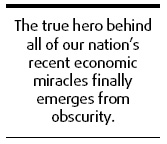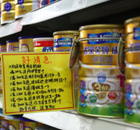Editorials
It's about Time
(China Daily)
Updated: 2009-12-18 07:53
 |
Large Medium Small |
In some ways they are not comparable with Ben Bernanke, the United States economic overlord and Time magazine's Person of the Year 2009.
In some others, they are beyond comparison.
Thank you Time magazine, for honoring The Chinese Worker as one of the only four runners-up. The accolade is something they deserve but perhaps do not get at home. That they have made it to the list, leaving Bernanke's Chinese counterpart far behind, may be more or less a surprise to some. But to us, if it is, it is a pleasant one. The true hero behind all of our nation's recent economic miracles finally emerges from obscurity.
Of course, they deserve the honor for propping up the country's, and in a sense the world's, economic backbone in such difficult times. As always, when they did attract the media's limelight, they had appeared as subjects of the slowing economy.
They have been constant first victims of factory closures, layoffs, and virtually all bad news involving the economy. But they turned out to be the most dedicated soldiers safeguarding the nation's economic wellbeing.

For that they deserve gratitude from all of us. The acknowledgement from Time magazine, however, set us wondering whether institutions at home would bother to give them such prominence. To us, it is long overdue.
We understand the standard Chinese formula for attributing achievements. More often than not, they are first and foremost the outcome of outstanding leadership and guidance by officials. So much so that the real heroes and heroines end up not even being given an honorary mention.
For too long, this has been the case with our working-class compatriots. For decades, their contribution to society has been significantly undervalued. And their welfare, on the other hand, severely neglected.
Time magazine published portraits of seven ordinary workers at a Shenzhen-based factory. They are actually among the relatively lucky ones among the hundreds of millions of migrant workers in this country. Despite their obvious contribution to local economies, they remain a source of trouble in the eyes of some local administrators. Equal treatment, therefore, is out of the question.
For one thing, migrant workers are denied welfare measures available to local residents of the communities where they work and live. And their children have to overcome various barriers to be allowed into a local school in a number of cities.
It would be a shame if such injustice persists.
(China Daily 12/18/2009 page8)









